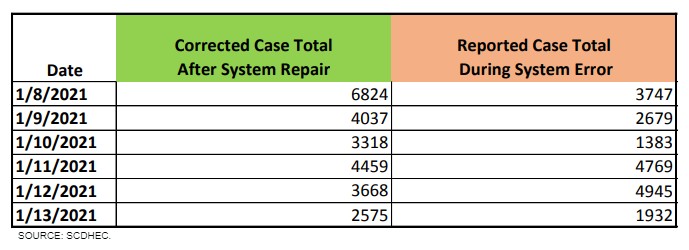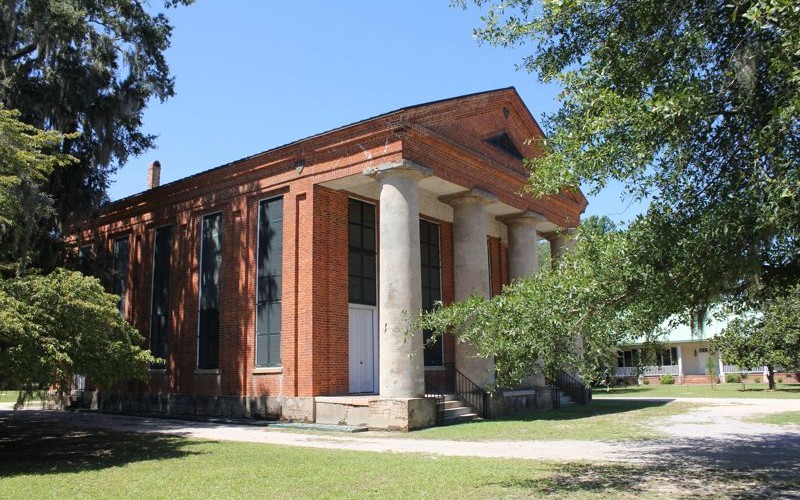STATEHOUSE REPORT | ISSUE 20.04 | JAN. 22, 2021
BIG STORY: How the state’s prison population dropped 30% in 11 years
NEWS BRIEFS: Lawmakers talk of expediting vaccine rollout
LOWCOUNTRY, Ariail: Talk about flooding
COMMENTARY, Brack: DHEC has trouble walking, chewing gum in pandemic
SPOTLIGHT: The S.C. Education Association
MY TURN, Brittain: S.C. House needs to slow down on Santee Cooper
EDITORIAL ROUNDUP: From inauguration and healing to redistricting and photo ID
FEEDBACK: Readers react to proposal that would cripple abortion
MYSTERY PHOTO: Historic building
How the state’s prison population dropped 30% in 11 years

By Rodney Welch, special to Statehouse Report | When S.C. Department of Corrections Director Bryan Stirling arrived on the job in 2013, his first order of business was to find out how prisoners who had done their time were released back into society.
He was in for an eye-opening experience.
Typically around the end of the month, prisoners who had done their time were taken to the Greyhound bus station on Gervais Street in Columbia in the wee hours of the morning. He witnessed vulnerable people who were not adept as transitioning back into the world they had left behind.

“I was not really happy with what I saw,” Stirling told Statehouse Report in an exclusive interview this week. “I saw people who just weren’t prepared to re-enter society safely. I came back and set about changing how we did re-entry.”
In just a few years, the S.C. Department of Corrections has seen a precipitous drop in its prison population — from 24,000 inmates in 2010 to just under 16,000 today. In 2009, Statehouse Report issued a set of Palmetto Priorities, which included cutting the state’s prison population by 25 percent. That now has been accomplished.
While reducing the prison population was not Stirling’s original goal, addressing the needs of the prison population is one of several factors he points to that has led to the reduction in prisoners.
Former S.C. Circuit Judge Michael Baxley, now in private practice in Charleston, cites other reasons. Most people, he said, believe that too many people are incarcerated. But through the years, there has been better coordination between parole, probation and prison, which has resulted in a lower prison population.
“There’s also been a legislative push — {Democratic] Sen. Gerald Malloy of Darlingston has been in the forefront of this — in reconfiguring sentencing and attempting to find alternative sentencing,” Baxley said. “That’s why you see the flourishing of things like drug courts and mental health courts.”
Baxley also credited public-minded organizations, such as Turning Leaf in Charleston, that are “working in fighting recidivism with tremendous success.”
Knocking down barriers
For Stirling, it takes the cooperation of several state agencies to assure a former inmate’s smooth transition back into society. At Manning Correctional Institution, for example, he set up a workforce agency in the prison.
“We had a lot of barriers to successfully reentering society,” he said. “We had some private partnerships, Catholic charities, Department of Employment and Workforce (DEW), and others, to try to get identification driver’s license, birth certificates. As you know, if you don’t have some type of ID, you really can’t get a job.”
Also, a strong economy has kept businesses interested in hiring from this steady labor pool.
“We had business after business calling us trying to find people to come to work,” Stirling said. “We found that there needed to be welders, and [we’d] really push people into welding degrees, we found out that there needed to be truck drivers. … Because of all the gas tax money, we bought heavy equipment simulation so we could train people to re-enter successfully.”
Other state partners include the state Department of Alcohol and Other Drug Abuse Services, which offers medically-assisted treatment for prisoners with drug addictions. Also, there’s the Department of Health and Human Services which offers help for prisoners with mental health issues.
Keeping in touch
 Stirling said the agency encourages people leaving the prison system to stay in touch, particularly when they get in a tough situation that could put them back in jail. He gave the example of a former prisoner who was trying to get his driver’s license, and was becoming frustrated because it looked as if he lacked the proper papers. A phone call to his former warden, who contacted the state Department of Motor Vehicles, resolved the issue.
Stirling said the agency encourages people leaving the prison system to stay in touch, particularly when they get in a tough situation that could put them back in jail. He gave the example of a former prisoner who was trying to get his driver’s license, and was becoming frustrated because it looked as if he lacked the proper papers. A phone call to his former warden, who contacted the state Department of Motor Vehicles, resolved the issue.
Stirling also cited the new inmate classification system from February of last year as a forward step. Under the previous system, a professional with no criminal record but who got drunk and committed felony DUI might be placed in a cell with a violent career criminal.
“We’re spending the same amount of money on security and staffing and things of that nature for two people, one of which probably, more likely than not, will never commit a crime again, will do their time, won’t cause any problems in prison and doesn’t really need a lot of supervision. That DUI person probably needs to be in a medium security prison with other similarly situated people. That violent career-long criminal and gang member needs more security, needs to have more eyes on him and [would] also be victimizing the DUI person again and again, and we would need to separate them.”
Education helps smooth transitions, too
Education is another major factor in the transition process as prisoners in various parts of the state have the opportunity for tech school or even college.
Under a new “Pathway from Prison” program with Claflin College, to be launched early this year, prisoners will have the opportunity to gain a bachelor’s degree.
“Receiving a degree not only changes the inmate;s life — it changes the lives of entire families,” according to Nena Staley, the Department of Corrections deputy director of Programs, Reentry and Rehabilitative Services . “We look forward to seeing many successful family stories as part of this program.”
Rodney Welch is a freelance reporter who lives in Elgin, S.C. Have a comment? Send to: feedback@statehousereport.com.
Lawmakers talk of expediting vaccine rollout

Staff reports | State lawmakers may spend more than $200 million to help with vaccine distribution and build up vaccine distribution capacity in South Carolina, The State newspaper reported today.
According to a resolution being discussed by the House Ways and Means Committee, lawmakers would appropriate $108 million from the state’s Contingency Reserve Fund to the state Department of Health and Environmental Control and the Medical University of South Carolina to expand statewide vaccination capacity quickly and continue to administer the state’s testing plan for COVID-19. The resolution calls for another $100 million to be placed in a vaccine reserve account to help pay for administration of the vaccine. Read the resolution.
In other recent news:
![]() Abortion ban moves forward. South Carolina’s state senators are nearing floor debate on a bill that would ban almost all abortions in the state without exceptions for pregnancies caused by rape or incest. The Senate Medical Affairs Committee passed the bill by a 9-8 vote Thursday. Some Democrats believe the bill will pass. More: AP News
Abortion ban moves forward. South Carolina’s state senators are nearing floor debate on a bill that would ban almost all abortions in the state without exceptions for pregnancies caused by rape or incest. The Senate Medical Affairs Committee passed the bill by a 9-8 vote Thursday. Some Democrats believe the bill will pass. More: AP News
S.C.’s Harrison becomes DNC chair. The Democratic National Committee elected Jaime Harrison of South Carolina as chair Thursday, signifying early alignment between newly inaugurated President Joe Biden and party leaders. More: CNN.
Harriford, Rezaeerod join Biden administration. Columbia native Scott Harrifod is the new liaison between the Biden White House and the U.S. Small Business Administration. Charleston native Paniz Rezaeerod will serve as deputy director of congressional affairs for the U.S. Department of Interior. More: The Post and Courier.
Police outnumber demonstrators at S.C. Statehouse. Police officers and journalists outnumbered demonstrators Wednesday at the S.C. Statehouse, which was closed to the public because of security reasons amid the inauguration of President Joe Biden in Washington. About one dozen people for and against the new president stood on the sidewalk while more than 40 officers were present. More: AP News. Meanwhile, South Carolinians were in the spotlight during the inauguration, including U.S. Rep. Jim Clyburn, D-S.C., and Charleston band Ranky Tanky.
Divided S.C. Supreme Court rebukes corruption prosecutor. In a 3-2 ruling, S.C. Supreme Court justices threw out a misconduct in office conviction for former S.C. Rep. Jim Harrison Wednesday based on Solicitor David Pascoe overstepping his authority, but also upheld an 18-month prison sentence for Harrison based on a perjury charge that Harrison lied to the grand jury. More: The Post and Courier
S.C. state flag flap is no flop just yet. Historians will continue work after public outcry over the “Charlie Brown” Palmetto tree on a newly designed state flag. The hope is to have an official state flag — something that hasn’t been done in 81 years — by June. More: South Carolina Public Radio
- Have a comment? Send to: feedback@statehousereport.com
Talk about flooding

Enjoy this new cartoon from Robert Ariail, first published in our sister newspaper, the Charleston City Paper. Love it? Hate it? What do you think: feedback@statehousereport.com.
DHEC has trouble walking, chewing gum in pandemic

By Andy Brack, editor and publisher | The South Carolina Department of Health and Environmental Control (DHEC) isn’t exactly a confidence-inspiring agency.
 Even before the coronavirus pandemic stretched its capacities and morale, the agency was a mess. The Great Recession of a dozen years ago caused big staffing and funding cuts. Its infectious disease unit, for example, lost half of its funding and 100 jobs, according to an April 2020 story in The Post and Courier.
Even before the coronavirus pandemic stretched its capacities and morale, the agency was a mess. The Great Recession of a dozen years ago caused big staffing and funding cuts. Its infectious disease unit, for example, lost half of its funding and 100 jobs, according to an April 2020 story in The Post and Courier.
A few years later came more cuts as then-DHEC Director Catherine Templeton wielded her “buzzsaw” through the agency. And in 2013, she had to apologize for the agency’s slow response in dealing with a tuberculosis outbreak that infected more than 100 people in Greenwood County. According to news reports, DHEC learned about an infected man in March, but didn’t test schoolchildren, 53 of whom got the illness, until the end of May.
Two years later, former Gov. Nikki Haley used the agency, whose directors are appointed by the governor, as a political pawn to investigate three abortion clinics. The department was put between a rock and a hard place. Eventually, it extricated itself after another uncomfortable spin in the spotlight.
And then in 2016 came another embarrassment — a stealthy rewrite of abortion regulations that put its policy culture in question and led to calls for it to be disbanded. At the time, we observed, “Lawmakers should investigate the policy culture at DHEC and, in our view, split the agency to reduce its power. It’s time to say the heck with DHEC.”
Last year came the Great Pandemic, which has stretched limited resources and stressed state government in never-expected ways. DHEC has been criticized for slow responses, poor communication, lackluster leadership and being the pawn of, yes, the current governor, Henry McMaster.

Senate President Harvey Peeler, R-Cherokee, is so frustrated that he is again calling for the agency to be split into a stand-alone health department with its environmental duties to be distributed to other agencies. Just before the 2021 legislative session opened, he said in a press release, “No one is in control at DHEC and hasn’t been for quite some time. … [My legislation] will ensure government runs more efficiently and will give each agency clearly defined responsibilities.”
So now comes more egg for the agency’s face: A data screw-up on the number of COVID-19 cases at a time when South Carolina is one of the nation’s hotspots for the virus.
On Jan. 16, a Saturday, the agency announced there had been a software problem with an internal database operated by a vendor. The result? Six days of incomplete data on the number of new coronavirus cases in South Carolina. The problem was fixed, the agency stressed, and the data had been updated.
“No data was lost or breached; there were delays in how electronic lab reports were being processed into the database,” DHEC spokesman Laura Renwick told Statehouse Report. “On Saturday, we also issued a historic breakdown for cases for the days that the database error occurred. While it’s unfortunate that this technical issue occurred, having a few days of delayed case counts in no way affected our public health actions.”
 But oddly enough, in fact, the data in question included what turned out to be the single biggest day ever of new cases on Jan. 8. DHEC initially reported 3,747 new cases, only to adjust it to 6,824 cases on Jan. 16. Over the six-day period of data instability, the agency reported 19,455 cases — some 5,426 less than updated on Jan. 16.
But oddly enough, in fact, the data in question included what turned out to be the single biggest day ever of new cases on Jan. 8. DHEC initially reported 3,747 new cases, only to adjust it to 6,824 cases on Jan. 16. Over the six-day period of data instability, the agency reported 19,455 cases — some 5,426 less than updated on Jan. 16.
You see where this is going? Data problems that happened when the largest number of cases ever experienced on a single day occurred in a new virus hotspot? Really?
DHEC’s actions in recent years and its lackluster leadership during this crushing pandemic that has infected more than 366,000 South Carolinians certainly do not inspire. We’ve heard some say it feels like the agency is flying a plane while trying to build it.
After years of underperformance and being a puppet of the governor, it’s time for the agency to be restructured into something new and and seek to restore its credibility among citizens.
Andy Brack is editor and publisher of Statehouse Report. His column also is published in the Charleston City Paper, Florence Morning News, Greenwood Index Journal, The (Seneca) Journal, Camden Chronicle Independent and Hartsville Messenger. Have a comment? Send to: feedback@statehousereport.com.
The S.C. Education Association
 The public spiritedness of our underwriters allows us to bring Statehouse Report to you at no cost. This week’s spotlighted underwriter is The South Carolina Education Association(The SCEA), the professional association for educators in South Carolina. Educators from pre-K to 12th grade comprise The SCEA. The SCEA is the leading advocate for educational change in South Carolina. Educators in South Carolina look to The SCEA for assistance in every aspect of their professional life. From career planning as a student to retirement assessment as a career teacher, The SCEA offers assistance, guidance, and inspiration for educators.
The public spiritedness of our underwriters allows us to bring Statehouse Report to you at no cost. This week’s spotlighted underwriter is The South Carolina Education Association(The SCEA), the professional association for educators in South Carolina. Educators from pre-K to 12th grade comprise The SCEA. The SCEA is the leading advocate for educational change in South Carolina. Educators in South Carolina look to The SCEA for assistance in every aspect of their professional life. From career planning as a student to retirement assessment as a career teacher, The SCEA offers assistance, guidance, and inspiration for educators.
- Learn more: TheSCEA.org
S.C. House needs to slow down on Santee Cooper

By Clay Brittain III, special to Statehouse Report | As a major commercial customer of Santee Cooper, I know rates for the hotels and resorts we manage are low and that the reliability of utility service to our properties is high. I am worried about a potential change in ownership of Santee Cooper, and I have big concerns about the “sell Santee Cooper” debate that’s happening in Columbia.

As it stands right now, the South Carolina House of Representatives is poised to pass a bill as soon as next week that authorizes a sale of Santee Cooper – ignoring the years of work and the recommendations of experts who were charged with soliciting and evaluating proposals for the sale, management, and reform of the state-owned utility that ultimately provides power to over half our State’s residents. Under H.3194, a committee of six legislators, three from the House and three from the Senate, would decide the fate of Santee Cooper and could completely ignore the evaluative, expert-informed negotiation process that has already occurred. Yes, H.3194 does establish significant reforms of Santee Cooper that would change how the utility operates until it is sold. But the reform elements of this bill are overshadowed by the rush to sell one of our State’s most valuable assets.
The SC House needs to slow down.
For the sake of customers and ratepayers we should all want any transaction or reform to include an arms-length negotiation, be transparent to its customers and stakeholders, based on known and independently confirmed data, and allow sufficient time for the best decision to be made. This bill requires little to none of these considerations. In fact, it is entirely possible that the House appointees to such a committee would already be predisposed to a sale based on comments from its leadership. It seems that right now the House is saying “full speed ahead” without even looking to see if torpedoes are in the water.
 As noted previously, we have already been through this process…yet here we are again. The Department of Administration (DOA), with numerous financial consultants and an exhaustive review, made recommendations to the General Assembly last year. The DOA recommended options for sale, third-party management, or reform of Santee Cooper and the General Assembly considered many of those last year. Yet, now, those recommendations are being ignored and the process is set to start again – likely because of an intense lobbying and a misleading PR campaign from shadowy groups. What is the source of the funding for those groups? NextEra recently refused a Senate Judiciary subcommittee’s request for details about its lobbying activity, campaign donations and payments to third-party groups, which could speak volumes about what in fact are the sources for this recent PR effort to circumvent the years of important and informed work on this subject.
As noted previously, we have already been through this process…yet here we are again. The Department of Administration (DOA), with numerous financial consultants and an exhaustive review, made recommendations to the General Assembly last year. The DOA recommended options for sale, third-party management, or reform of Santee Cooper and the General Assembly considered many of those last year. Yet, now, those recommendations are being ignored and the process is set to start again – likely because of an intense lobbying and a misleading PR campaign from shadowy groups. What is the source of the funding for those groups? NextEra recently refused a Senate Judiciary subcommittee’s request for details about its lobbying activity, campaign donations and payments to third-party groups, which could speak volumes about what in fact are the sources for this recent PR effort to circumvent the years of important and informed work on this subject.
There is legitimate concern about Santee Cooper’s recent history. But there have also been deliberate steps (albeit small ones) by Santee Cooper leadership towards reform. Has the utility done enough to reform itself? Not even close. But they have also not done enough that warrants turning one of our State’s most valuable economic assets over to an out-of-state private interest with less-than-transparent practices.
A lot of legislative time has been spent on the issue of Santee Cooper, but it is a big decision. South Carolina must get it right. This is not a decision to be made on old data, no process requirements, and no guidelines. Any action – either selling or reforming the utility – without intense and thoughtful consideration of these issues would work counter to what is truly best for Santee Cooper customers and the State.
Clay Brittain III of Myrtle Beach is chair of Brittain Resorts & Hotels, which manages 20 resorts in the Grand Strand. Have a comment? Send to: feedback@statehousereport.com.
From inauguration and healing to redistricting, photo ID
Here’s a new feature that will link you to opinions from editorial pages around the state:
 Investing in children is a unity move
Investing in children is a unity move
“The move toward unity could get a push from the sheer numbers in Washington. Democrats control the White House and Congress, but the majority in the House is razor thin and Democratic control of the Senate only comes with the vote of Harris amid a 50-50 split among the lawmakers.”
— The Orangeburg Times and Democrat, Jan. 22, 2021
Hicks: Hollings helped pave way for Biden
“In his inaugural address, President Joe Biden noted ‘There’s no accounting for what fate will deal you.’ That could sum up the 46th president’s entire political career … or at least serve as a subtle nod to the influence of one of Charleston’s favorite sons.”
— The Post and Courier, Jan. 21, 2021
America needs to heal
“We hope talk of further violence and even civil war is just that — talk. America needs to heal and get behind that which unites us, not that which further drives a wedge. And it needs to begin now.”
— Greenwood Index-Journal, Jan. 20, 2021
Fear of extremist challengers highlights importance of redistricting
“For the state and country to get even more partisan is not in anyone’s interest. It chills debate. It limits the marketplace of ideas. It hogties compromise and progress.”
— Charleston City Paper, Jan. 20, 2021
S.C. needs a better photo ID system
“Photo-bearing Social Security cards would, according to law enforcement, significantly improve the integrity of the I-9 employee-verification process. It would be much harder for workers to use another person’s card.”
— The Orangeburg Times & Democrat
Simpkins: We must be born again
“From the slave-labor based business venture that was the Carolinas to denial of WWII-era government contracts to continued redlining and police-involved killings, our national addiction to race and racism is deep and profound. It clouds our collective judgment in the organization of our economy, the formulation of policy, and even what constitutes ‘disruption’ through entrepreneurialism and innovation. But rather than admire the problem, it’s worth focusing on Dr. King’s prescription.”
— Charleston City Paper, Jan. 18, 2021
Readers react to proposal that would cripple abortion
To the editor:
![]() While opposing opinions are expected, I feel I must respond to Andy Brack’s vicious editorial calling the Heartbeat Bill “legislative trash,” and the Governor’s words “hogwash.” Aside from the insults and name-calling, his arguments are in large part disingenuous, misleading, false and inaccurate.
While opposing opinions are expected, I feel I must respond to Andy Brack’s vicious editorial calling the Heartbeat Bill “legislative trash,” and the Governor’s words “hogwash.” Aside from the insults and name-calling, his arguments are in large part disingenuous, misleading, false and inaccurate.
Mr. Brack claims that passing the heartbeat bill is a “waste of time” because it is unconstitutional, other states have passed it and it is already on appeal to the Supreme Court. Mr. Brack is leaving out some very important facts. First, the informed consent part of the bill (that requires an abortion provider to allow the mother to see an ultrasound of the child), was upheld by the U.S. Supreme Court in the 2018 case of EMW, et al. v. Meier. Go look it up, Mr. Brack. That provision alone gives women greater information and has been proven to save lives.
The portion of the bill that bans abortion when a heartbeat is detected certainly has a greater probability of passing our Supreme Court than ever before with conservatives now in the majority. Constitutional attorneys I know believe that the old “viability” standard used in the 1973 opinion of Roe v. Wade is no longer valid because science has progressed and we have learned much more about life in the womb in the last 48 years. Many scholars, (including constitutional attorney Walter Weber, and even George Will), believe that the Court could uphold state legislation substituting the heartbeat as a marker rather than “viability” without fully overturning Roe.
The final scare tactic used by Mr. Brack falsely claims the bill has no exceptions for the health of the mother. Mr. Brack should read the bill before he decides to write about it. The bill as written carves out exceptions in the event of serious health consequences to the mother, according to the treating physician. Pro-life people understand that the mother’s life is also precious and equal to any other life. Although many pro-life people are strongly opposed to additional exceptions for rape and incest (since adoption is an alternative) the bill will likely be amended to include these exceptions before it is passed.
In his editorial advocating for abortion (and praising the organization that sells body parts and profits from abortion), Mr. Brack’s use of the word “trash” is ironic to me. You see, to that group and Mr. Brack, the word “trash” is what describes an unborn life —“trash” to be thrown out with the garbage. To me, that word is what best describes his editorial.
— Rep. John McCravy, Greenwood. McCravy is a Republican state representative who serves on the House Judiciary Committee. He is primary sponsor of H. 3163, the fetal heartbeat bill.
Editor’s note: McCravy sent a 700-word retort to last week’s commentary. What’s above is an excerpt. If you want to read his full remarks, check out his op-ed in the Greenwood Index-Journal.
Don’t take away woman’s right to choose
To the editor:
Thank you for your recent article. You are spot on!
I think it is strange that the GOP conservative base and conservative leaders act as though the government is forcing women to have abortions. That’s ridiculous! However, they want to take away a woman’s right to choose!. It just doesn’t make any sense.
— Catherine Swindell, Greenwood
When standing before God in judgment
To the editor:
I would hate to be someone that had anything to do with killing a spirit that God sent to earth to gain a body and have the opportunity to prove himself or herself worthy to once again return to his presence and stand before God on judgment day and explain why I would take this action. Good luck with that!
— Bob Selph, Florence
Honor life
To the editor:
Your words “Mind numbing, time wasting” are reflective of how you value the life of the unborn. You don’t value the innocent! I expect my state legislators, Leatherman and Lowe, to vote to honor life.
— Gerald Braun, Florence
Send us your thoughts
We love hearing from our readers and encourage you to share your opinions. But to be published, you’ve got to provide us with contact information so we can verify your letters. Letters to the editor are published weekly. We reserve the right to edit for length and clarity. Comments are limited to 250 words or less. Please include your name and contact information.
-
- Send your letters or comments to: feedback@statehousereport.com
Historic building

Here’s a historic building somewhere in South Carolina. What is it and where? Send your guess to feedback@statehousereport.com — and remember to include your name, home city and contact information.
 Last week’s mystery, “In stereo,” showed stereoscopic photos of the war-damaged sally port of Fort Moultrie in 1865.
Last week’s mystery, “In stereo,” showed stereoscopic photos of the war-damaged sally port of Fort Moultrie in 1865.
Congratulations to those who identified it correctly: Jay Altman of Columbia; George Graf of Palmyra, Va.; Allan Peel of San Antonio, Texas; Penny Forrester of Tallahassee, Fla.; Kevin Mertens of Greenville; Judy Hines of Charleston; and Charlotte Overman of Fort Mill.
Altman shared that from April of 1863 until February 1865, Confederate forces at Fort Sumter and Fort Moultrie were bombarded by the Union navy. Confederate troops left Fort Moultrie when the army’s forces left Charleston as Gen. W.T. Sherman’s forces neared Charleston, although they diverted to Columbia.
Peel shared information that is on the back of the photo, which is in the Library of Congress: “Additional information published by Quinby & Co. is printed on the back of the photo, as shown here. It reads (including some grammatical errors): “This picture presents a view of the Sally-Port of Fort Moultrie after the war. The Sally-Port is situated on the land side of the Fort, and was well protected from within. It was approached from the parade ground of the Fort, and was constructed of solid brick work of several feet in thickness. The walls above show the effects of the fire from Fort Sumter and Morris’ Island, as well as the IronClads and other vessels of the fleet off the bar. This old Fort, of revolutionary origin and renown, acted as a very conspicuous part in the late war. It is worthy of a visit from strangers visiting Charleston.”
Graf noted that a sally port is a secure, controlled entryway to an enclosure, e.g., a fortification or prison. The entrance is usually protected by some means, such as a fixed wall on the outside, parallel to the door, which must be circumvented to enter and prevents direct enemy fire from a distance.
He added that stereoscopic photography was very popular in the 19th and 20th centuries for their ability to recreate the illusion of three-dimensional view for viewers using a stereoscope viewer.
- Send us a mystery. If you have a photo that you believe will stump readers, send it along (but make sure to tell us what it is because it may stump us too!) Send to: feedback@statehousereport.com and mark it as a photo submission. Thanks.
 ORDER NOW: Copies are in Lowcountry-area bookstores now, but if you can’t swing by, you can order a copy online today.
ORDER NOW: Copies are in Lowcountry-area bookstores now, but if you can’t swing by, you can order a copy online today.
ABOUT STATEHOUSE REPORT
Statehouse Report, founded in 2001 as a weekly legislative forecast that informs readers about what is going to happen in South Carolina politics and policy, is provided to you at no charge every Friday.
Meet our team
- Editor and publisher: Andy Brack, 843.670.3996
- Special correspondent: Lindsay Street
Donate today
We’re proud to offer Statehouse Report for free. For more than a dozen years, we’ve been the go-to place for insightful independent policy and political news and views in the Palmetto State. And we love it as much as you do.
But now, we can use your help. If you’ve been thinking of contributing to Statehouse Report over the years, now would be a great time to contribute as we deal with the crisis. In advance, thank you.
Buy the book
Now you can get a copy of editor and publisher Andy Brack’s We Can Do Better, South Carolina! ($14.99) as a paperback or as a Kindle book ($7.99). . The book of essays offers incisive commentaries by editor and publisher Andy Brack on the American South, the common good, vexing problems for the Palmetto State and interesting South Carolina leaders.
More
- Mailing address: Send inquiries by mail to: 1316 Rutledge Ave., Charleston, SC 29403
- Subscriptions are free: Click to subscribe.
- We hope you’ll keep receiving the great news and information from Statehouse Report, but if you need to unsubscribe, go to the bottom of the weekly email issue and follow the instructions.
- Read our sister publications: Charleston City Paper (every Wednesday) | Charleston Currents (every Monday).
- © 2021, Statehouse Report, a publication of City Paper Publishing, LLC. All rights reserved.


